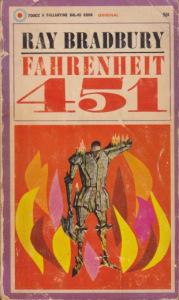 It’s been a few years since I read Fahrenheit 451, the classic novel by Ray Bradbury.Like so many dystopias, it’s seen a resurgence of interest since 45 was elected.(I can’t help but notice the shared digits.)Bradbury was a writer of his time.So much, I suppose, could be said of all of us who write—how can we be anything else?Still, it’s difficult not to see that his fear was of television decimating reading.And intelligence.We’ve got the internet now, so the effect has been magnified a bit.The tale, despited being dated, is poignant.The more electronic we become the more of what used to be termed “real life” we miss.At this reading it was clear that The Book of Eli was largely based on the last pages.
It’s been a few years since I read Fahrenheit 451, the classic novel by Ray Bradbury.Like so many dystopias, it’s seen a resurgence of interest since 45 was elected.(I can’t help but notice the shared digits.)Bradbury was a writer of his time.So much, I suppose, could be said of all of us who write—how can we be anything else?Still, it’s difficult not to see that his fear was of television decimating reading.And intelligence.We’ve got the internet now, so the effect has been magnified a bit.The tale, despited being dated, is poignant.The more electronic we become the more of what used to be termed “real life” we miss.At this reading it was clear that The Book of Eli was largely based on the last pages.
When Montag confesses to his wife that he’s been secreting books away, and she finds him insane for doing so, he takes the book in his hand to a former acquaintance, Faber.It turns out that the book is the Bible, perhaps the last in existence (see what I mean?).On the subway ride he tries to memorize the Good Book.Now, I’ve been on the New York City subway, and I know the delays can be long, but there’s an error of scale here.The Bible’s a big book.Still, he gets pieces of it down.Now, in the 1950s, when Fahrenheit 451 was published, the Bible was known for its liberating qualities rather than its darker side.Also the atomic end of World War II was clearly still a painful living memory.The two may not be unrelated.
Given the age of the story, I won’t worry about spoilers.In case, however, it’s on your list proceed with caution.The war that’s been building the entire story takes place the night of Montag’s escape.Along with the intellectuals forced out of the cities, he becomes part of a human library.Each person is, through a memory recovery technique, capable of recalling the books they’ve read.Montag becomes, appropriately enough, Ecclesiastes.Perhaps the least evangelical book in the Bible, along with Job (with which most evangelicals find themselves cheering on Job’s friends), Qohelet has long been one of my favorites.It’s an honest book.The same can be said for Bradbury’s novel.Primarily a short story writer, Bradbury didn’t sustain the narrative to novel length very often.But when he did he fashioned a book that, particularly now, needs to be read.
